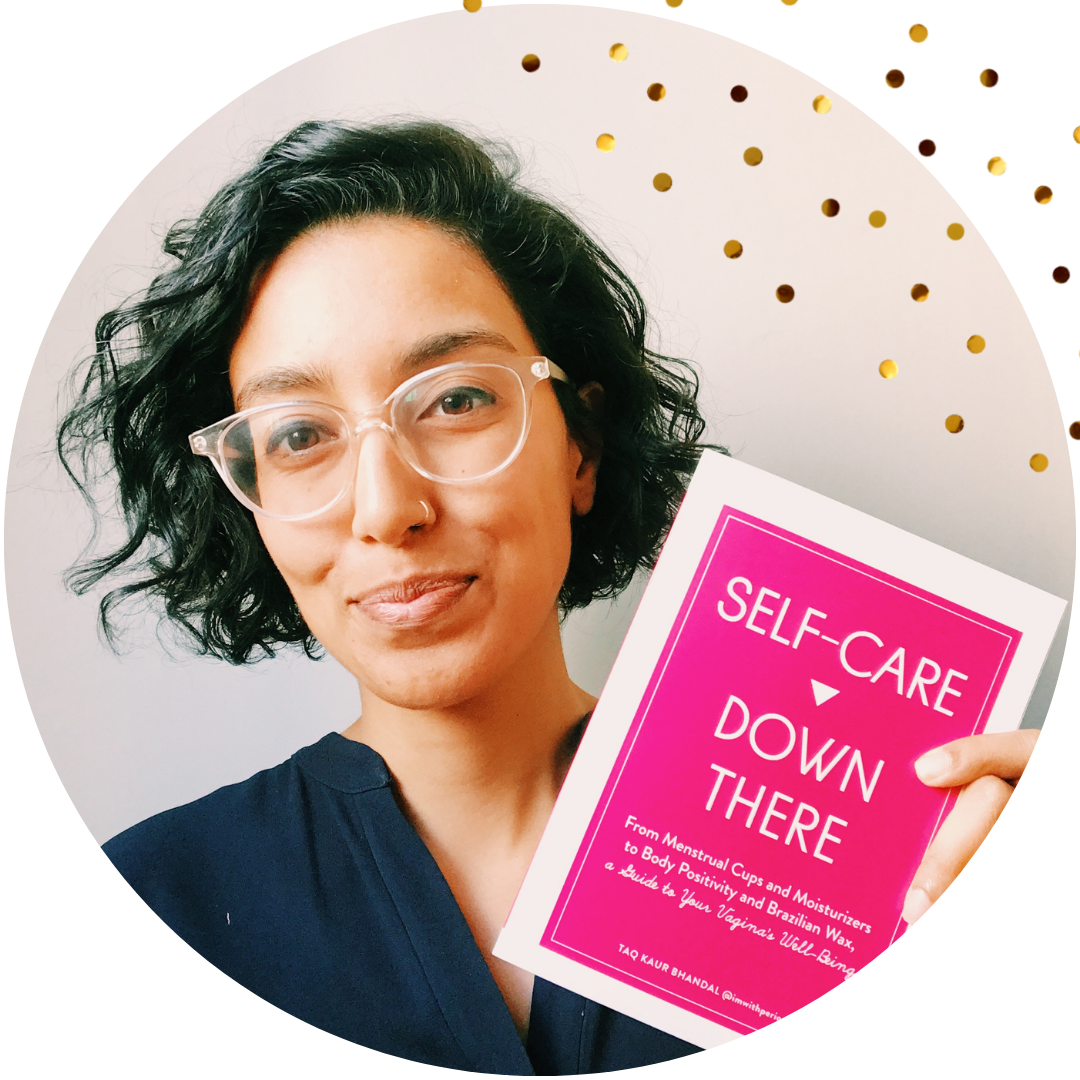Author, Taqdir Kaur Bhandal and her book Self-Care Down There
Hi y’all Sat Sri Akal!!! My name is Taqdir Kaur Bhandal and I’m the founder of @imwithperiods and the author of Self-Care Down There. I would love to share some of my perspectives on Sikhism, Periods, Sexuality, and Mahwari Cycles with you today!
Sikhism and Gender Equality: Sikhism is one of the religions where scriptures and the entire faith are based on gender equality. Born in the Punjab area of modern-day India and Pakistan, the first Sikhs were frustrated with interpretations of religion causing a lot of war at the time (Note that there are lots rad folx who are sharing and practicing feminist interpretations of the Vedas, Quran, and more! - See our blog post: It's in our blood: Positive Beliefs of Sikhism, Islam, Buddhism, and Hinduism on Menstruation). As such, One Being Is (Ek Oan Kar) is one of the main tenets/beliefs of Sikhism. That regardless of gender, sex, sexuality, village, ancestry, racialized identity, religion, income, age, etc. we are all human and we can treat each other with kindness, respect, and empathy.
Mahwari is the Punjabi word for Menstruation: The first Gurus (leaders in the Sikh faith) really emphasized the power and beauty of menstruation or mahwari ਮਾਹਵਾਰੀ, childbirth, and more. These are all processes of yonis, and the pelvis of people who are assigned female at birth. Many different genders can experience mahwari cycles, especially women!
Sikh Feminist Scholars to Read: Much of my learning about mahwari cycles and sikhism comes from Nikky Guninder Kaur Singh who writes, “the Khalsa is not created from individual parts of the body…but through the natural, [metaphorically] maternal process, with all its emotions, complexities, and hormonal effects.” I share my writing based on her work and many additional scholars in my new book Self-Care Down There.
Modern Day Sikhism: Like the Abrahamic texts, modern-day Sikhism practiced in Gurdwaras (Sikh temples) can be quite traditional and sometimes in contradiction to the origins of the religion. For example, in some major cities of India, women and menstruators are discouraged from entering the temple when they are on their periods. Now, in North America and beyond, Sikh sex education is becoming more and more prominent which is great. Times are cyclical back towards gender equality. For example, In 2019, millions of women in India formed a 619 km protest wall in honour of breaking down taboos associated with being on our periods and in a temple. Just like they were able to move forward with their visions and manifestations, I know we can continue to evolve humanity and our collective towards respectful relationships with each other, Mahwari cycles, and the land. In another big win, UK’s oldest Gurdwara (Sikh Temple) in Shepherd’s Bush also recently launched a new period policy. Free period products, public education to reduce stigma, and workshops on mahwari health! We are once again moving towards envisioning and practicing feminist Sikh principles around the world. I mean I got to work with Simon & Schuster to write a book about vagina’s y’all. It’s pretty amazing.
Does Sikhism accept LGBTQ2SIA+ identities: Excitingly, queerness, homosexuality, and more diverse sexualities are very much welcomed and celebrated by Sikhs (for sure I do!). Let’s take one quick peek at the Kama Sutra everyone and remember that our ancestors loved to get it on in all the ways and do it respectfully.
Sikhism and Self-Care: Generally, I practice Sikhi through three principles that can also be translated to promoting self-care:
Langar, a meal that is served at no cost in any Gurdwara = gotta have food to fuel our pelvic and overall wellness
Sangat, a community of compassionate people = such as the one you and I are creating here together;
Seva, service to humanity and the more-than-human world = taking care of our mahwari cycles and overall health while also respecting the health of the planet.
Sikhism, Tantra, and Slow Sex: One of the main principles of Sikhism is aesthetics, pleasure, and bhog (Hygge). See our blog post on Bhog & Hygge here. Below, I share 3 tips for amazing consent-based sexual relationships based in Sikhi:
Tip 1: See how slow we can go
Practice by ourselves and/or boyfriends, girlfriends, partner(s), fiancés, husbands, and more.
slow burn anyone?
can count as mindfulness meditation
more pleasurable for everyone regardless of sex, gender, or sexuality
Play around with being totally in darkness (heightening the senses of sound & touch) to having one low light on.
Malefolk: I’m on a mission to lower the rate of females and diverse sexes feeling the need to fake orgasms from 50% (Coming to Power, Fahs, 2013) to 0%. I would love for you to be in it with me ;)
Tip 2: Invest in a water-based lubricant & non-toxic condoms
Water-based lube works with pretty much any kind of condom and/or toy (more on this in our book Self-Care Down There)
Easy to wash out in the laundry
Eliminates a lot of unwanted pain during sex of all kinds.
CONDOMS: No matter who you are having sex with, I highly encourage you to use protection in the form of condoms. There are condoms for all sexes. I typically have sex with male folks, and really like the brand Glyde because their male condoms are natural, vegan, and non-toxic: https://www.glydeamerica.com/
Tip 3: Have an ‘everything in the pantry’ at-home date night with ourselves and maybe with partner(s)
A slow-cooked daal or stew with dessert
Fun drinks of any kind
Wear our fav outfit or jewelry (emphasis on our personal fav, not what we think someone else will like)
Reminiscing: “remember that time when I or we….”
We are in it together friends! Spreading the word about the principles of Sikhism, sex, and mahwari is going to take our collective strength. Gurdwaras are introducing free period products in bathrooms, offering sex education, and maybe even one day we will start the Ardaas by acknowledging the life force of periods and cycles.
I wonder, can we create a resurgence together?
Question for Further Reflection: Take 10-15 minutes to reflect on the following questions. What kinds of statements and stories are told about the vagina & yoni and its powers in the Guru Granth Sahib and other scriptures? What were the Gurus, sisters, wives, non-binary mentors, and followers’ original intentions with Sikhism? How are modern teachings different? How do we talk about and learn about mahwari cycles, menstruation, and sexuality in our Sikh households? What are you taking from these teachings, and what’s ready to be let go?
Hi & Sat Sri Akal, I’m ਤਕਦੀਰ ਕੌਰ Dr. Taq Kaur Bhandal, the CEO of I’m With Periods. To learn from me, enroll in my online courses for women and our boyfriends or get a copy of my book Self-Care Down There. I am physically based in Halifax, Nova Scotia on Mi’kmaq Treaty Territories. I was born and raised on the west coast of Canada close to Vancouver, British Columbia. My ancestors and family are from the Punjab region of India and Pakistan. I’m passionate about long walks in the forest with my fiancé and dog, and reading rom-coms in the bath.
Photographer: Nikhilesh Badhwar


